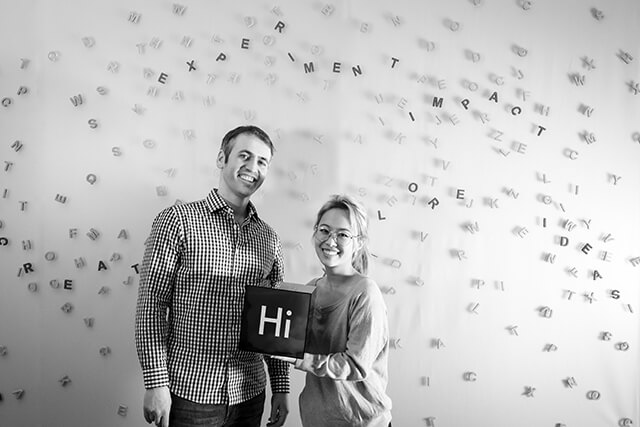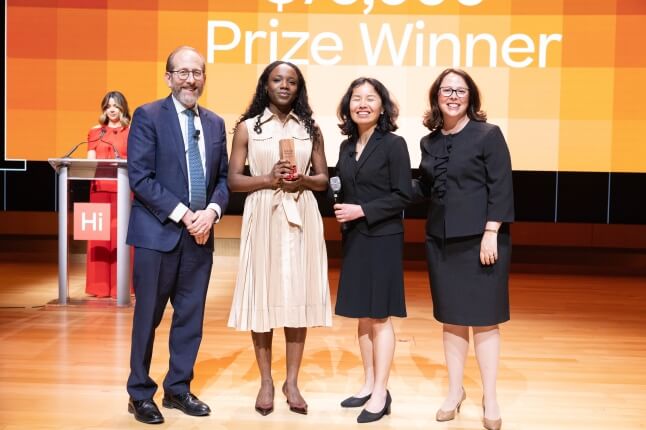News
Mary Gao and Jonathan Petts co-founded Immigrants Like Us, a nonprofit that helps people fill out immigration forms for free.
Navigating the U.S. legal system has become so costly and complex that immigration remains out of reach for many disadvantaged individuals who quality for legal status.
Standard immigration paperwork often includes more than 100 pages of legal jargon, and the cost of an immigration lawyer averages around $3,000 for green card cases—money that many immigrants don’t have.
Enter Immigrants Like Us, a nonprofit that helps people fill out immigration forms for free. The startup won the silver medal in the social track of this year’s i3 Innovation Challenge, sponsored by the Technology and Entrepreneurship Center at the Harvard John A. Paulson School of Engineering and Applied Sciences. Immigrants Like Us was also recently featured in Forbes and Fast Company.
“We deliver free immigration help to some of the most disadvantaged immigrants, including low-income and humanitarian cases,” said Mary Gao, A.B. ’21, a computer science concentrator. “It is more difficult than ever to file for immigration because of policy that has made the legal system even more complex. But by having our system that uses simple language and built-in attorney intelligence, it really simplifies that legal system for these immigrants.”
Immigrants Like Us offers three core services. The first is an online quiz that serves as a universal eligibility screener, helping an immigrant determine which of the 180-plus visas they are qualified for, and with what risk. The startup also offers what Gao calls a “TurboTax for immigration,” and then a free expert review of the generated immigration forms.
Using a straightforward form with simplified language, an individual inputs personal information and uploads supporting documents. The system then auto-generates legal forms, which are reviewed by an attorney and then sent back to the immigrant, ready for filing.
Because the system is built using attorney intelligence and much of the process has been automated, an attorney can review the paperwork in about 30 minutes, compared to the five-hour average for immigration cases, Gao said.
“Because we have that intelligence built into the system and an attorney spends so much less time per case, we can support so many more people, and have a much more outsized impact, without having the need for millions of lawyers,” she said.
Free for immigrants, the service earns revenue through lawyer referral fees when individuals opt to work with traditional attorneys. For instance, someone may choose to file paperwork with a traditional attorney if they have a special case, or if they are over a certain income level, Gao explained.
That revenue model will be critical for the startup’s success, since fundraising in the era of COVID-19 has been one of the biggest challenges the founders have faced, she said. Another challenge comes from the volatile nature of immigration policy.
“Immigration policy is constantly changing. Every president has the power to add new visas, or change immigration policy, at any time. The Supreme Court is trying to decide the fate of DACA and Dreamers,” she said. “If you are building software to try to automate some of this process, you really have to be on top of all of these policy changes and take them into account.”
She and her co-founders have relied on the support and mentorship of the i3 program to launch the startup. And the Harvard Innovation Labs has provided the team with space to work, as well as entrepreneurial experts they can bounce ideas off of.
Since its launch six months ago, Immigrants Like Us has completed nearly 100 cases for immigration renewals, green cards, and citizenship forms. In April alone, 45 new users started the process. And the founders have spoken with more than 1,000 immigrants about visa eligibility and other immigration questions.
Moving forward, their next major goal is to translate their services into Spanish and, by the end of the year, they hope to have completed 500 cases, Gao said.
For Gao, the opportunity to make an impact on so many lives is rewarding.
“As an immigrant myself, I know what a big deal this is. My life is forever changed because I left China,” she said. “We estimate that there are about 14 million immigrants who are legally eligible to get status, but they can’t do so because they can’t afford a lawyer. We are really excited to be scaling up to those 14 million.”
Topics: Entrepreneurship
Cutting-edge science delivered direct to your inbox.
Join the Harvard SEAS mailing list.
Press Contact
Adam Zewe | 617-496-5878 | azewe@seas.harvard.edu



